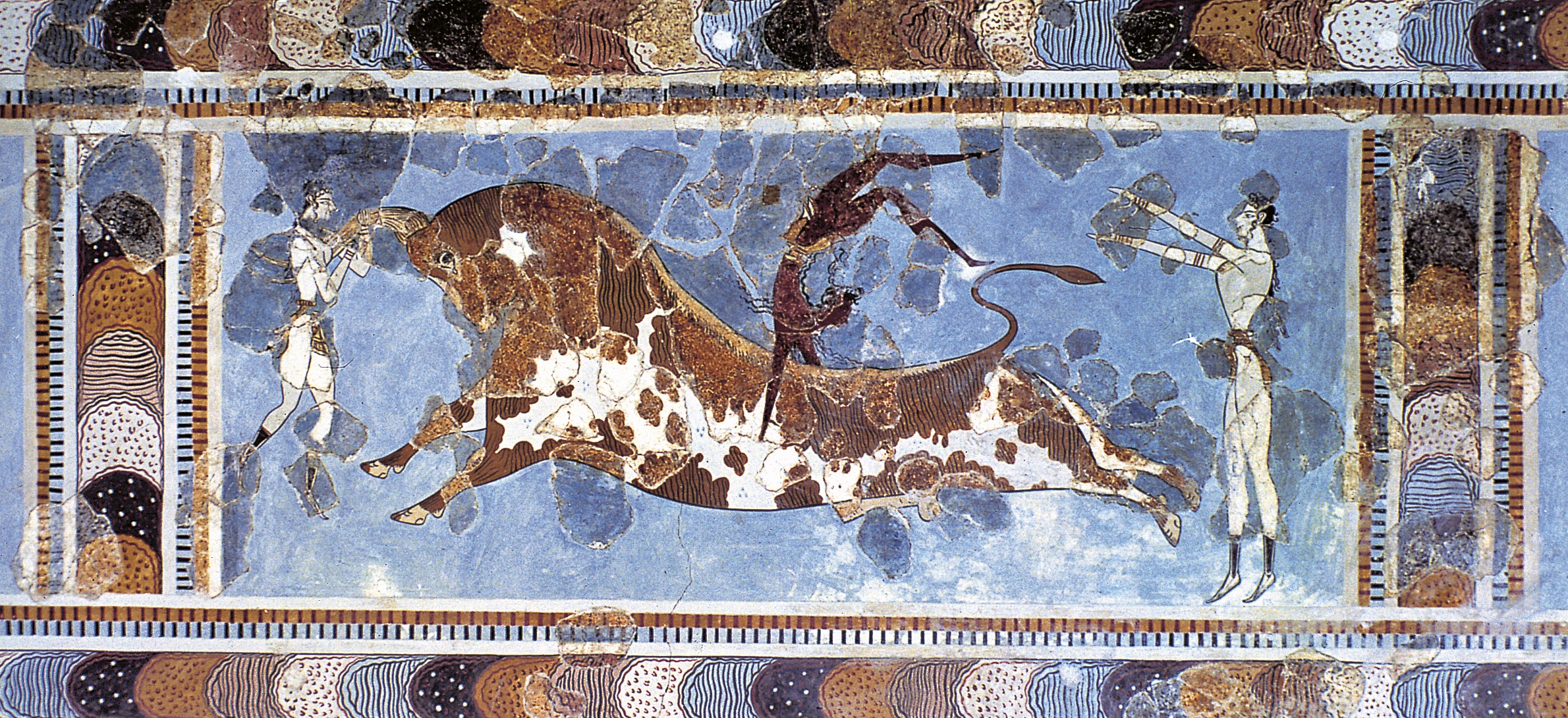
Livius Andronicus is responsible for spreading the legend of Odysseus, the mythical king of Ithaca, with another name: Ulysses. In fact, this was the name that the Greece-roman dramatic, in his translation of the Odyssey from Greek into Latin in the third century BC, wanted to give to the character who, already present in the Iliad, became the protagonist of the most famous epic poem of the ancient world.
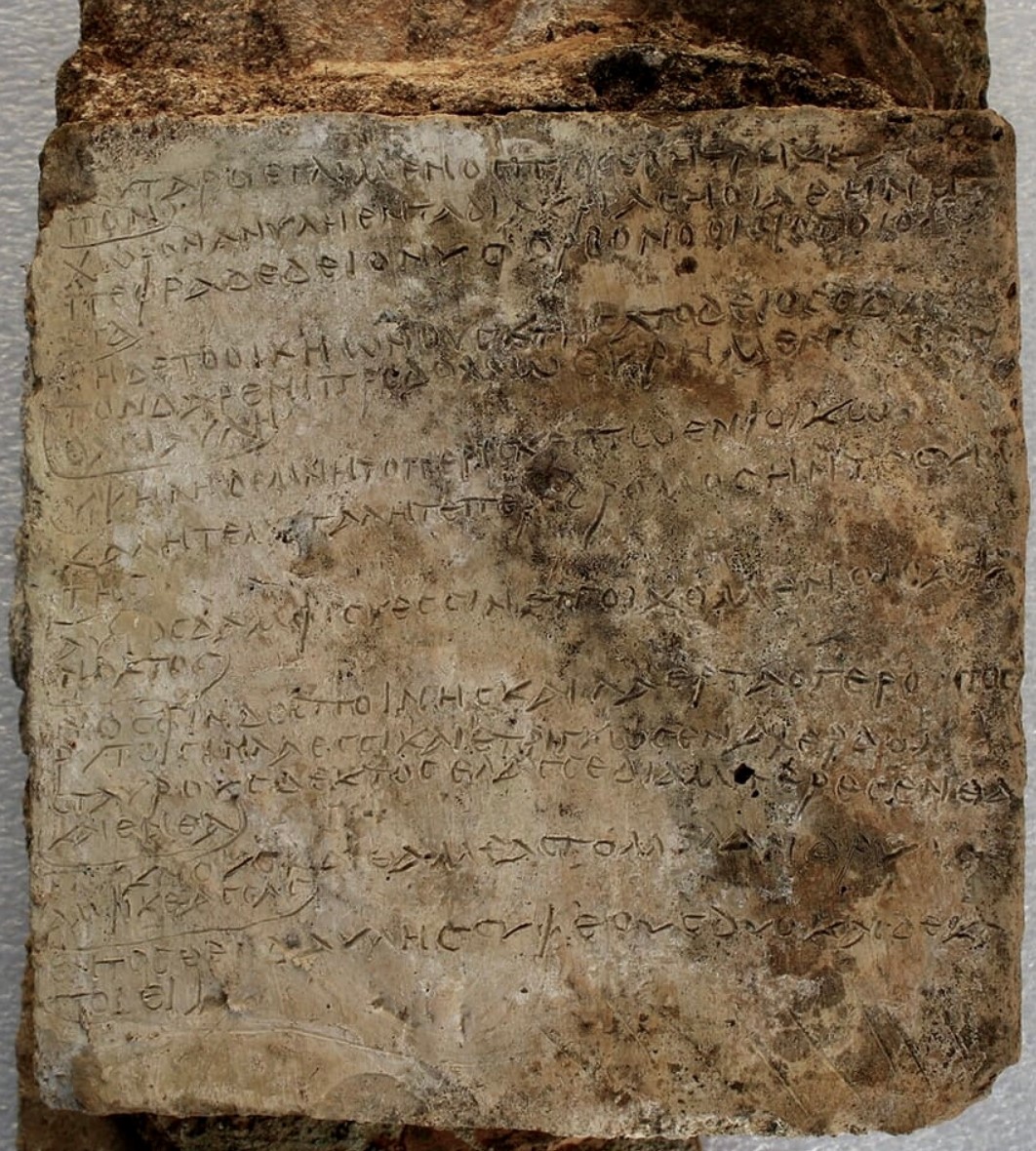
Clay tablet with verses from Lib. 14 of the poem Odyssey found in Olympia, 3rd century AD - Archaeological Museum of Olympia EL
Tradition tells that it was the grandfather Autolycus who wanted to give that name to his nephew, son of Laertes and Anticlea, precisely because of its meaning which recalled the motif that had marked his life: My life to this point has been marked by hatred of many people, both men and women […]
. So the name would derive from the archaic verb odýssomai, meaning to be irritated, an explanation that some consider paretymological and instead suggest an Anatolian root, from the language of the Carians, from the term Lýxes with however an obscure meaning, therefore restrictive but which by the way supports the legitimacy of the choice made by Livius Andronicus for his Ulixes.
In Ithaca, a small island in the Aegean Sea, Laertes son of Arcesius had arrived after taking part in the great enterprise of the Argonauts and became its king. He belonged to the lineage of Decaulion and descended from Cephalus who had married the daughter of the archaic king Erechtheus of Athens, and this already made him and his descendants legitimized by the gods to govern.
According to a different version of the myth - the one also followed by Homer - Odysseus' father was not Laertes but Sisispho, the one who had also tried to deceive Zeus.
The story began in the lands near the isthmus of Corinth where Sisyphus but also Autolycus lived and both owned herds of cattle; it happened that Sisyphus noticed that animals in his herd were decreasing day after day while Autolycus herd was increasing more and more. Sure that Autolycus was the thief, Sisyphus devised a stratagem to unmask him: he had carved the letters SS on animals hooves indicating him as the owner. That night Autolycus stole more cows and Sisyphus promptly went to his stables to prove that he was the thief; it did not help Autolycus to use the power that Hermes had given him to transform the white cows into black and the horned ones into hornless ones, and vice versa, the letters engraved on the hooves indicated Sisyphus as the real owner. But Sisyphus was not satisfied with having got the better of his rival with his cunning: while everyone was arguing he entered the house of Autolycus and seduced Anticlea, his daughter and already married to Laertes. From the union was born Odysseus who would thus inherit his cunning from his real father, Sisyphus.
Although there are two different versions on the circumstances of his birth - the first tells that he was born in Boeotia during the return journey of Laertes and his new wife to Ithaca while the second indicates in Mount Nerito in Ithaca the place where Odysseus would be born during a rainy night – both equally tell the story of Odysseus childhood and adolescence.
Laertes and Anticlea in Ithaca led a simple life and both devoted themselves to the education of their son. Odysseus lived on the small Aegean island, learned the art of hunting and became a good archer who soon began to excel among the young people of Ithaca and to create fame among the Greek rulers for his physical abilities, intelligence and wit that he had largely inherited from his father's lineage or from Sisyphus, but also from his maternal grandfather Autolycus, grandson of the god Hermes. Odysseus was also known for his great skill in archery so much so that he earned the nickname of Hypsipylus which indicated the abilities similar to those of the goddess Artemis, the lunar goddess of hunting, who was given the nickname of Hypsipyle for the arc that described in the sky in hers various manifestations.
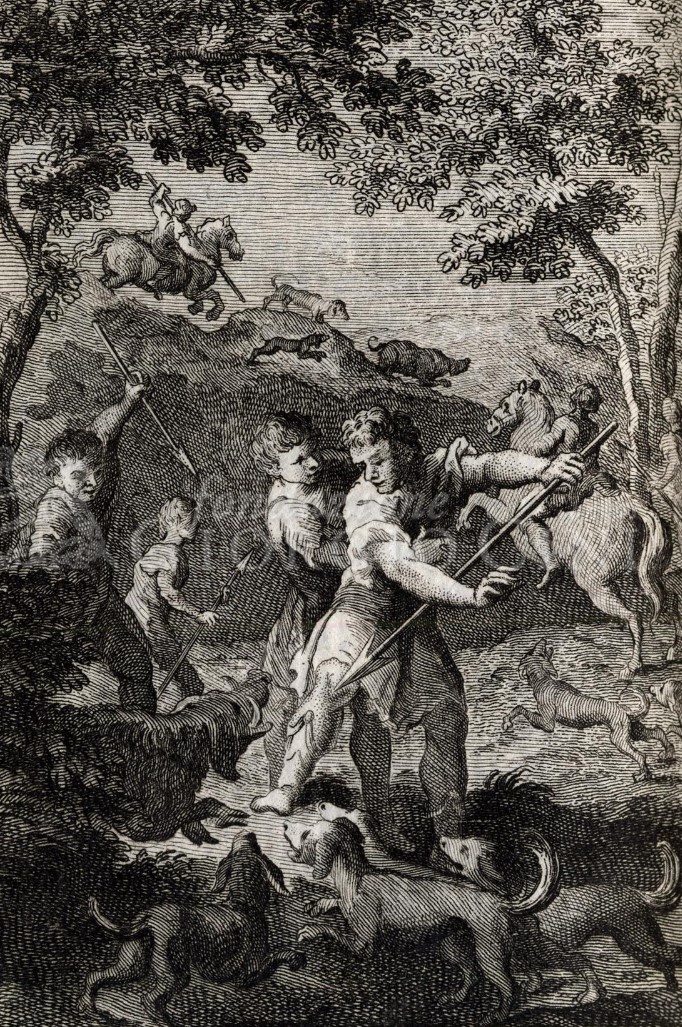
Odysseus wounded by a wild boar on Mount Parnassus. Engraving 1785 – ITM Venice IT
When he was still a child, his grandfather Autolycus promised Odysseus rich presents the day he was old enough to fetch them at his residence on Mount Parnassus. As soon as Odysseus became strong enough he went to visit Autolycus and it was here that the hunting accident occurred that caused the wound to his thigh, the one that left the scar from which his nurse recognized him many years later. Autolycus called the best doctors for Odysseus, had him treated and sent him back to his parents with the gifts he had promised him.
Homer in the Odyssey book XIX summarizes what had happened:
… in Ithaca. The father and the noble mother
they rejoiced at her return and asked a thousand questions,
and why he had a wound; and he will tell them well
as a white-tusked boar struck him,
climbed Parnassus with the sons of Autolycus.
Bow hunting was one of the great passions of the young Odysseus and he was a true champion of it and sufficiently aware of his own ability to recognize himself, among the archers of his time, second only to Philoctetes but, as Homer reports in the Odyssey, not would never have dared to compete with the archers of previous generations such as Heracles and Eurytus, true legends who also challenged the gods.
His friendship with Iphitos, the mythical archer of Ecalia to whom his father Eurytus had left the wonderful bow given to him by Apollo, was born from his skill with the bow; that bow Ifitus in turn wanted to give to Odysseus as a sign of friendship. That bow will be the weapon with which Odysseus many years later will kill the Suitors who had invaded his house.
Young king of Ithaca, Odysseus also presented himself in Sparta as a suitor for Helen and it was he who suggested to Tyndareus - worried about future rivalries between so many kings and princes since only one could be the bridegroom - to make everyone swear that whoever was the lucky one, the others would help him in case someone kidnapped his wife. Helen married Menelaus, the richest, and all the rejected suitors found themselves so bound by that promise that it became the foundation of the alliance of the Achaean kings who waged war against Troy.
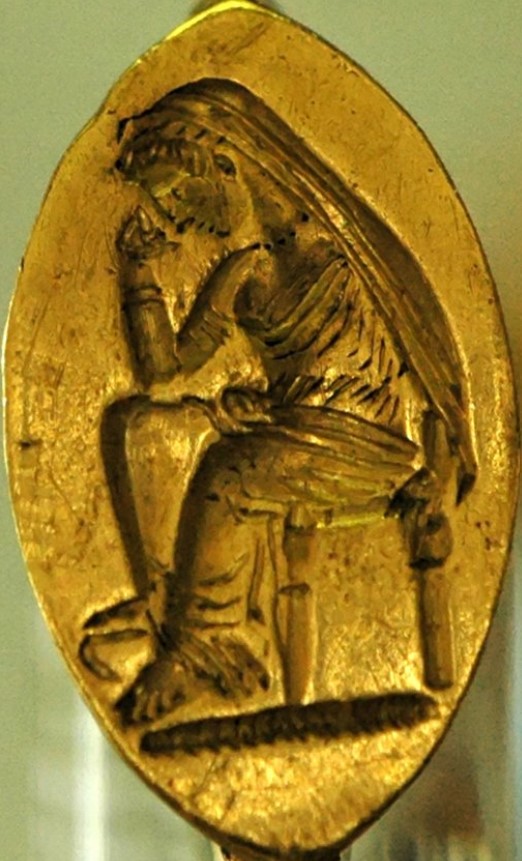
Penelope. Cutwork on gold ring 5th cent. B.C. - Cabinet des Medailles, Paris FR
As in his character, in exchange for his suggestion Odysseus asked Tyndareus for a favor: to be helped to marry Penelope, daughter of his brother Icarius. However Icarius banned a race among all the suitors and Odysseus was the winner; it seems because Icarius had facilitated his race along the road to Sparta called Afeta. After the wedding Odysseus decided to return to Ithaca, even if, as usual, Icarius had offered him to stay in Sparta, he preferred to go back to being the king of his small island. Penelope then got on the chariot to follow the groom to his new home but the father could not resign himself to losing that extraordinary daughter and chased the chariot of the bride and groom, intercepted it four miles outside the walls and begged his daughter to go back. Penelope was torn and so Odysseus put her in front of a choice: to go with him to Ithaca or to return to Sparta but without him.
Penelope said nothing and covered her head with the veil following the custom of married women, she had chosen: she would be Odysseus' wife in the house he had chosen for them. Icario understood and let her daughter go.
This episode of the mythical life of Odysseus reveals that even after the Hellenes had imposed their supremacy, the social rules dictated by the previous civilization resisted; it was organized in a matriarchal way and therefore the succession on the throne was matrilineal. The new rulers detached themselves only in reference to who was to hold power, in fact in the matrilineal society governed by a queen, the successor was always a queen. The new rulers early on replaced the Queen with her husband who was no longer a Holy King destined to live only one year, but the husband of the dead king's daughter.
With his decision to return to Ithaca with Penelope to be the ruler of the kingdom that he would inherit from his father, Odysseus breaks with all the ancient schemes and starts a new path trusting in his ability but above all to feel free to be and try new things. , but above all it makes explicit the transition from matrilineal to patrilineal society.
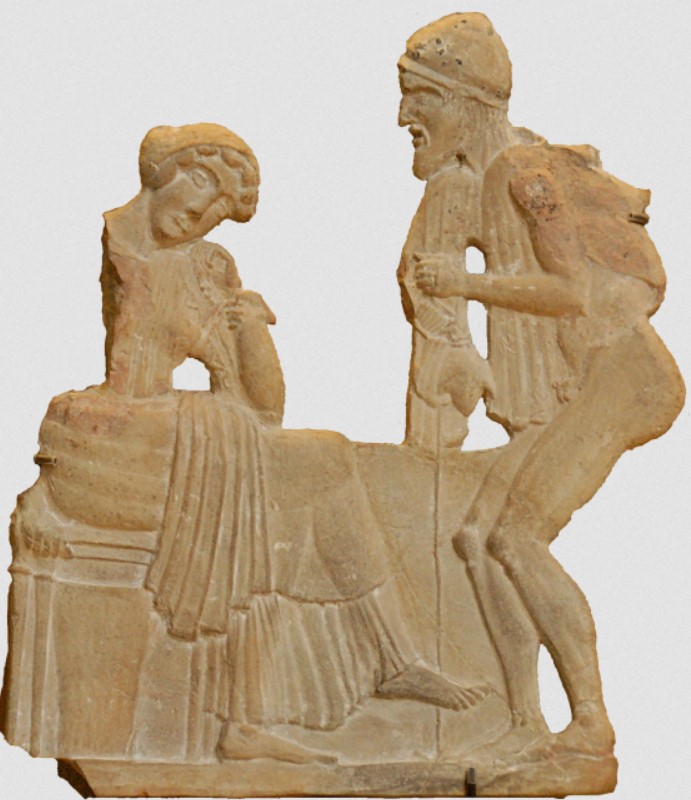
Terracotta with Odysseus and Penelope, 460–450 BC, from the island of Melos - Louvre Museum, Paris FR
The life of the young couple in Ithaca would not have been one of luxury and entertainment but it would have been a simple life as it should have been on a small island where olive trees were grown and flocks of sheep grazed. The rhythms and rituals of the bucolic life had always punctuated Odysseus' life and in Ithaca he had developed the ability to work wood, and trusting in his abilities and in his competence in woodworking, before going to look for his bride had prepared the wedding bed and around this built the room and the house, what would become the palace of Ithaca.
The young man eager to get married had looked for a large olive tree that had its roots well planted on the hill and having found one with a prodigious trunk, he created the nuptial bed inside this: a bed on which to join his bride and that no one it could never have taken away planted as it was firmly on the hill overlooking Ithaca.
Only the two spouses were immediately aware of the uniqueness of that bed and Penelope will use this secret many years later when a traveler arrived in Ithaca to then introduce himself as Odysseus and claim his rights over the kingdom, but first of all over the house and the bride.
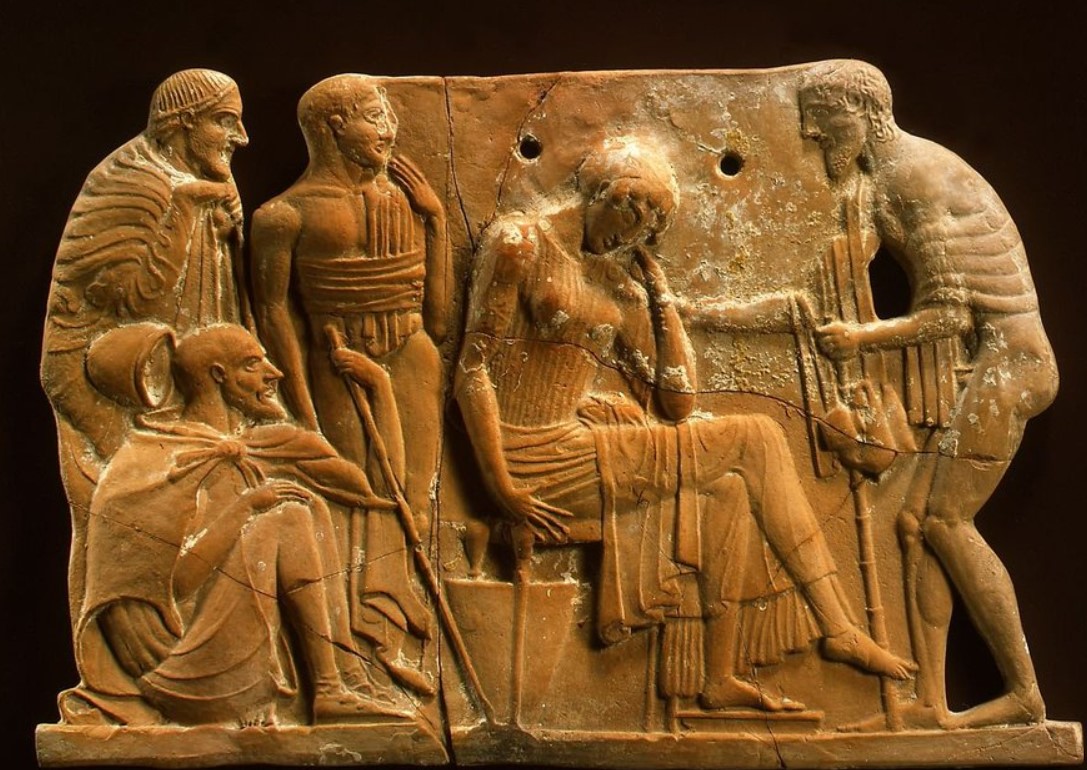
Ulysses shows himself to Penelope disguised as a beggar. Melian terracotta ca 450 BC – Metropolitan Museum, New York USA
First part: rev.0 by M.L. ©ALL RIGHTS RESERVED (Ed 1.0 - 21/03/2023)
